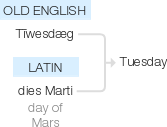Tuesday
Old English Tīwesdæg ‘day of Tīw’, a Germanic god of war and the sky; translation of Latin dies Marti ‘day of Mars’, the god Tīw being equated with the Roman god Mars. Compare with Swedish tisdag .
wiktionary
From Middle English Tewesday, from Old English tīwesdæġ(“Tuesday”), from Proto-West Germanic *Tīwas dag(“Tuesday”, literally “Tiw's Day”). This was a Germanic interpretation of Latin diēs Martis, itself a translation of Ancient Greek Ἄρεως ἡμέρα(Áreōs hēméra) (interpretatio romana). Cognate with Scots Tysday(“Tuesday”), Saterland Frisian Täisdai(“Tuesday”), West Frisian tiisdei(“Tuesday”), dialectal German Ziestag(“Tuesday”), Danish tirsdag(“Tuesday”), Swedish tisdag(“Tuesday”). More at Tyr, day.
etymonline
Tuesday (n.)
third day of the week, Old English tiwesdæg, from Tiwes, genitive of Tiw "Tiu," from Proto-Germanic *Tiwaz "god of the sky," the original supreme deity of ancient Germanic mythology, differentiated specifically as Tiu, ancient Germanic god of war, from PIE *deiwos "god," from root *dyeu- "to shine," in derivatives "sky, heaven, god." Cognate with Old Frisian tiesdei, Old Norse tysdagr, Swedish tisdag, Old High German ziestag.
The day name (second element dæg, see day) is a translation of Latin dies Martis (source of Italian martedi, French Mardi) "Day of Mars," from the Roman god of war, who was identified with Germanic Tiw (though etymologically Tiw is related to Zeus), itself a loan-translation of Greek Areos hēmera. In cognate German Dienstag and Dutch Dinsdag, the first element would appear to be Germanic ding, þing "public assembly," but it is now thought to be from Thinxus, one of the names of the war-god in Latin inscriptions.
